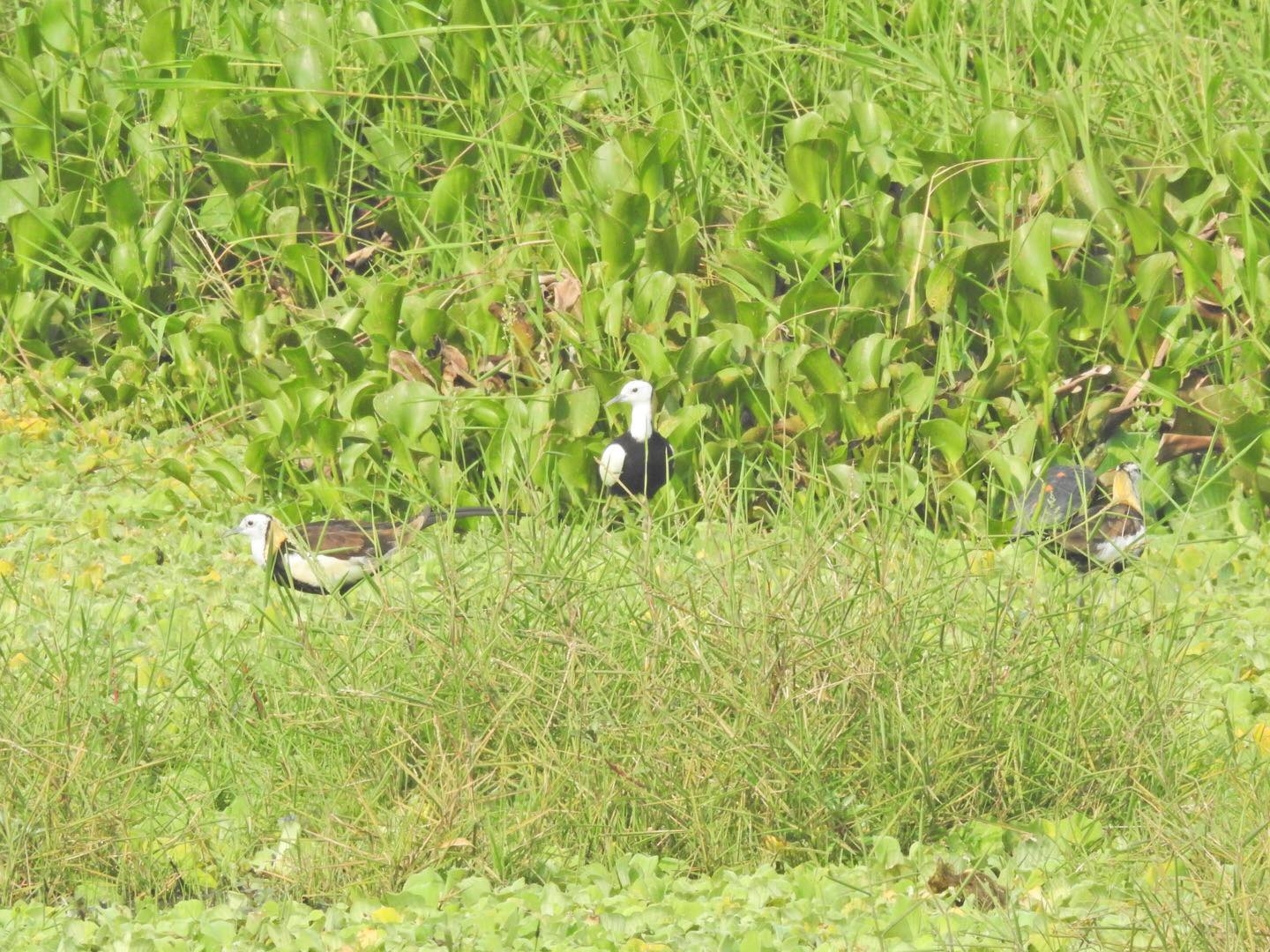From the habitat of water pheasant to see the state of agricultural conservation environment, the crisis brought by population aging is very big
In March of this year, media reports pointed out that some green energy operators persuaded farmers in the Kuantian area to lease farmland as a site for installing solar photovoltaic panels, offering a rent of 40,000 yuan a year higher than the market rent price (6000 yuan a minute) for a lease of 20 years, attracting farmers to join; some farmers agreed, others waited, and this matter attracted the attention of ecological protection groups. This action is similar to planting electricity in Chiku fish ponds, Putai salt pans and Taoyuan ponds. It not only seriously affects the wetland ecology, but also endangers the weak farmers, fishermen and agricultural and fishery production systems. It may further affect the national security and social problems of food self-sufficiency.
In 2000, the country's first pheasant rehabilitation park was established in Guantian, Tainan. Because the high-speed railway passed through the then pheasant winter area-Hulupi, under the requirements of environmental impact assessment, the public and private departments cooperated to lease 15 hectares of land from Taiwan Sugar to create a pheasant rehabilitation area, entrusting the Bird Association and the Shih League to adopt and maintain management. At that time, the number of pheasants in China was less than 50. After more than ten years of efforts, incentive policies such as habitat construction and nest discovery in water chestnut fields worked, making water chestnut fields in Guantian area become friendly habitats for pheasants. At present, the number of pheasants in China has exceeded 1,000.
Guantian is also the largest professional area of water chestnut in the country, covering an area of more than 300 hectares. Although a small number of middle-aged Ling farmers have joined in the past ten years or so, most of them have been engaged in farming by the original group of Ling farmers with an average age of 60 or 70, some even over 80 years old! Not only is his physical strength not as good as before, but he is also lured by the lucrative profits of green energy companies. It is difficult to ensure that the water chestnut industry in Kuantian can last for how long?
Private land near Meinung Lake in Kaohsiung has successfully created wetlands to attract pheasants to breed.
Population aging is a major problem facing Taiwanese society. It not only affects social stability, agricultural production, and food self-sufficiency, but also indirectly affects the wild animals and plants that depend on the agricultural ecosystem for survival, including water snakes, amphibians, dragonflies, fish, and even pheasants. Let us imagine: when water chestnut fields are rented in large numbers for solar photovoltaic panels and the area shrinks, the habitat will be affected. Will the number of pheasants also decline? The answer is predictable. Therefore, maintaining farmland area and agricultural ecosystem is an important issue for biodiversity conservation today. The development of green energy policy should not be based on the destruction of wetland and agricultural and fishery environment. Besides strict supervision of green energy operators 'exploitation of wetlands, farmland and fish farms, how can we respond positively to the reduction and degradation of habitat for pheasants? The establishment and restoration of habitat for pheasants may provide another feasible direction.
From 2017 to 2018, retired teachers Liu Xiaoshen and Huang Shumei rented a deserted depression beside Meinong Lake to plant aquatic floating-leaf plants, successfully attracting water pheasants to nest and breed; in the spring of 2019, Gao Xiongniao Association also mobilized volunteers to join the habitat construction. Meinung Lake is one of the few freshwater ponds in Kaohsiung where pheasants can be found, and the surrounding environment is still farmland environment. It is also a special production area for aquatic crops such as "wild lotus," which coincides with the type of water chestnut area in Kuantian. If we can successfully establish habitat for pheasants around Lake Meinung, and extend this environmentally friendly practice to the surrounding wild lotus fields and even to the habitat improvement of Lake Meinung, although there is no direct help to the reduction of water chestnut fields due to photovoltaic development in Kuantian, we can reduce the impact on pheasant populations!
In 2019, Gao Xiongniao will mobilize volunteers to join in the construction of pheasant habitat around Lake Meinung.
On the other hand, the decline of farmers is also a major crisis for the survival of pheasants! Here, we encourage people to eat more water chestnut so that the water chestnut industry can continue to maintain and maintain the habitat of the pheasant. At the same time, we also urge those who are concerned about environmental conservation to join the ranks of "habitat volunteers" and become a different kind of "ecological farmers" to alleviate the pressure of aging farmers to reduce the area under cultivation. There are so many retired people nowadays that instead of buying a piece of land to build a farmhouse to reduce agricultural production, they will end up weeding and doing work. If they can participate in volunteer work, they can not only help maintain the existence of wetland agricultural ecosystems, but also actively protect the indicator species and various organisms in wetlands. At the same time, they can enrich their retirement life. Why not do both?
Meinong Lake in Kaohsiung is one of the few freshwater ponds in Kaohsiung where pheasants can be found, and the surrounding environment still retains farmland environment.
The pressure of Taiwan's aging population has pushed agriculture and farmland to face an unprecedented crisis! If people who care about agriculture, land, and ecology can pass on their love for the environment and land to the next generation by raising funds, donating money, donating land, trusting, and participating in volunteer work, and become happy "ecological farmers," perhaps it will be another turning point in the crisis of the environmental protection movement!

- Prev

What are the characteristics of Athena cantaloupe? Mature time of disease resistance of Athena Hami melon seedlings
Athena melon is a medium-sized cantaloupe with an average of 5-6 pounds. The outside has a tough outer skin, and the thick net is covered with light orange skin. The interior of Athena has a classic cantaloupe appearance, with a thin bright green ring on the outer skin.
- Next

Honey Bun cantaloupe variety specific, Honey Bun cantaloupe planting technology and growth management
Honey Bun is a true shrub cantaloupe, perfect for smaller gardens. Melons have deep orange flesh and honey sweetness. Each grapevine will produce 3 or 4 fruits. Honey Bun cantaloupe seedlings appear 7-14 days after sowing, once the seedlings appear
Related
- A course of planting techniques and methods on how to grow carrots
- How to plant the latest tulips?
- Is it better to pick tea in the morning or in the afternoon? When is the best time for tea to be picked? what is the third or fifth tea?
- Launch Yuanxiao Happy combination Haocha + Tea Yuan healthy Taste
- Penghu Tourism "Fireworks 20 Parade with You"
- 2022 West Lake Happiness holds "Digital Revitalization Voucher" and draws iphone13 and laptop.
- Banqiao Fuzhou social houses are designed to change start-up combined with police elimination to create a safe and livable environment
- The convenient measure of "mechanical weeding" in Xinbei has been abused and the Agriculture Bureau has imposed heavy penalties on the illegal land consolidation.
- Changgeng University Joins Hands with Four Memory Factories to Rescue Memory Talent Shortage
- The list of Taiwan's top 100 MVP managers is listed by the Director-General of the Farmers' Association of Sanxia District.

